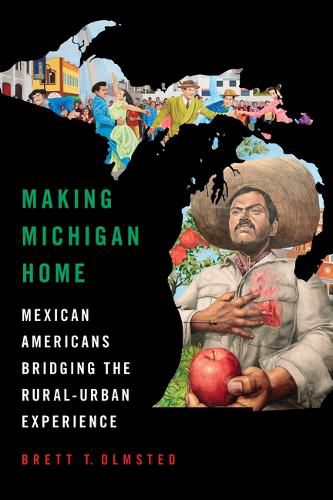Readings Newsletter
Become a Readings Member to make your shopping experience even easier.
Sign in or sign up for free!
You’re not far away from qualifying for FREE standard shipping within Australia
You’ve qualified for FREE standard shipping within Australia
The cart is loading…






Shaping a distinctive Midwestern form of Mexicano identity Mexicanos in Michigan and across the Midwest share a common experience: living as largely invisible outsiders as they struggled to build vibrant communities in places that wanted their labor but not their presence. Brett Olmsted ranges from the 1920s to the 1970s as he analyzes how Mexicanos sought to transcend social, cultural, economic, and political exclusion. Never numerous in any one area, Mexican Americans pursued inclusion via leisure spaces and labor unionism. Activities like celebrations, sports, movies, and music encouraged Mexicanos to claim physical and social space, connect with Michigan's other Mexicano communities, and construct their own sense of identity. Mexicano workers, meanwhile, embraced interethnic union activism to address racism in job placement and promotion. Olmsted also examines how the state's Mexicanos adapted to Michigan's dual economy and found advantages in moving back-and-forth between rural and urban areas. In-depth and innovative, Making Michigan Home spotlights the state's overlooked Mexicanos and their distinctive experiences within the Latina/o/x Studies Midwest.
$9.00 standard shipping within Australia
FREE standard shipping within Australia for orders over $100.00
Express & International shipping calculated at checkout
Shaping a distinctive Midwestern form of Mexicano identity Mexicanos in Michigan and across the Midwest share a common experience: living as largely invisible outsiders as they struggled to build vibrant communities in places that wanted their labor but not their presence. Brett Olmsted ranges from the 1920s to the 1970s as he analyzes how Mexicanos sought to transcend social, cultural, economic, and political exclusion. Never numerous in any one area, Mexican Americans pursued inclusion via leisure spaces and labor unionism. Activities like celebrations, sports, movies, and music encouraged Mexicanos to claim physical and social space, connect with Michigan's other Mexicano communities, and construct their own sense of identity. Mexicano workers, meanwhile, embraced interethnic union activism to address racism in job placement and promotion. Olmsted also examines how the state's Mexicanos adapted to Michigan's dual economy and found advantages in moving back-and-forth between rural and urban areas. In-depth and innovative, Making Michigan Home spotlights the state's overlooked Mexicanos and their distinctive experiences within the Latina/o/x Studies Midwest.